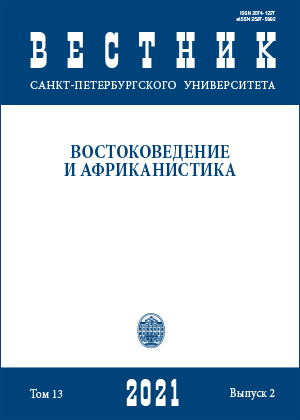Ontological-dynamic Concepts of the I Ching Tradition and the Model of their Linguocultural Analysis
DOI:
https://doi.org/10.21638/spbu13.2021.208Abstract
The accumulated historical experience and rich cultural heritage of the pre-axial Chinese civilization are concentrated and reflected in the ancient Chinese language. Therefore, linguistic methods of studying traditional Chinese philosophy and its conceptual apparatus are becoming relevant in modern Sinology. By focusing on the material of ancient Chinese philosophical works, it is possible to reconstruct the conceptual apparatus of traditional Chinese philosophy and culture in general, and some of the classics in particular. Among the sets of fundamental terms, it is worth highlighting the compendiums by Chan Wing-tsit, Joseph Needham, A. I. Kobzev, Wu Yi and A. M. Karapetyants, which formed the basis of this study. The object of the study is the ontological-dynamic concepts, and its purpose is to develop a model of their linguocultural analysis demonstrated on the example of certain terms, first of all, 人 ren, 德 de and 道 dao. The statistical analysis of conceptions of the I Ching tradition, namely “The Appended Commentaries”, helps to construct a monocentric semantic field of ontological terms with a heterogeneous core. This model of linguocultural analysis proves to be universal for many philosophical concepts.
Keywords:
China, Chinese language, linguoculturology, semantic field, compendiums of traditional Chinese philosophy and culture, ontological-dynamic concepts, Appended Commentaries
Downloads
References
Downloads
Published
How to Cite
Issue
Section
License
Articles of "Vestnik of Saint Petersburg University. Asian and African Studies" are open access distributed under the terms of the License Agreement with Saint Petersburg State University, which permits to the authors unrestricted distribution and self-archiving free of charge.





